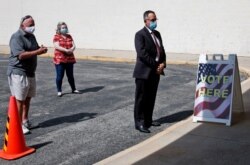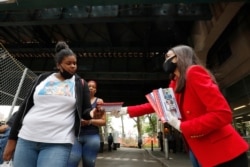Ahead of a contentious general election in November, U.S. political parties and legal groups are waging fierce battles over voting rights in multiple states that could determine the outcome of America’s presidential contest.
The battles reflect a mostly partisan tug of war over whether states should prioritize the preservation and expansion of democratic participation or take restrictive steps to ensure no fraudulent ballots are cast.
“Voter suppression is alive and well. It's a threat to democracy,” said Kristen Clarke, president and executive director of the Lawyers’ Committee for Civil Rights Under Law. Her organization has been fighting in the courts to protect the right to vote since 1965, when the Voting Rights Act was signed into law by then-President Lyndon B. Johnson.
Voter suppression refers to tactics intended to influence the outcome of election by discouraging or preventing specific groups of people from voting.
“These are schemes often perpetrated against Black people, against the Latino community and Asian-American community,” Clarke told VOA. Voting rights advocates say they are especially concerned about so-called purging practices, in which some eligible voters are removed from registration lists.
What some see as voter suppression, others see as necessary steps to protect the integrity of balloting.
“Voter fraud is real, and some people are going to cheat,” said Rick Esenberg, president and general counsel of the Wisconsin Institute for Law & Liberty. His organization has filed a lawsuit contending the state’s election commission ignored the law by leaving nearly 200,000 old and outdated voter registrations on the rolls. State law requires the agency to remove the names of voters if it receives “reliable information” that those individuals have moved. “Such voter roll cleansing improves accuracy and prevents the potential for voter fraud,” Esenberg told VOA.
Nationwide, an estimated 33 million Americans were purged from the voter rolls between 2014 and 2018, according to the Brennan Center, a nonpartisan law and public policy institute with offices in New York and Washington. Its studies found the growth in the number of purged voters has far outpaced that of both the total registered voters and total population.
Battleground Wisconsin
Wisconsin voters could determine who the next president will be. The Midwestern state proved pivotal in President Donald Trump’s 2016 victory. He flipped the Democratic-leaning state, beating Hillary Clinton by fewer than 23,000 votes out of 2.7 million cast. Today, political analysts view it as a must-win state for both Trump, a Republican, and his presumptive Democratic Party challenger, former Vice President Joe Biden.
Multiple court cases seek to maintain accurate voter registration lists. Some want robust voting protections while others are calling for greater accessibility for voters. The legal struggles come as Wisconsin election officials removed 14 percent of the state's voters from registration rolls between 2016 and 2018, nearly double the national average.
Researchers demonstrated Black voters were nearly twice as likely to be taken off voting rolls as white voters living in suburban communities. The state also instituted a strict voter identification law in 2016.
“In Milwaukee [Wisconsin] and other places, we've seen that a strict photo ID law makes it harder for Black voters and other minorities to participate,” said Clarke. “More recently, amid the pandemic, in April the state held a primary election when we saw startling images, lines of largely Black voters waiting to cast a ballot in a city that literally went from having 180 polling sites to just five,” she said.
Voter fraud and early voting
Some legal challenges are focused on efforts to prevent fraud and other irregularities.
"Wisconsin voters deserve to have confidence in the integrity of this year’s elections. We hope the Supreme Court agrees to review our case and provide clarity on the actions of the Wisconsin Elections Commission,” Esenberg said. He believes voter roll accuracy is especially important during the pandemic, as more people may prefer early voting and mail-in absentee ballots instead of going to polling places on Election Day.
Over the last decade, more states have instituted early voting. In July, a federal appeals court reinstated a Republican-backed law that allows local election officials to offer two weeks of early voting before Election Day. In a past election in Wisconsin, Milwaukee offered nearly six weeks of early voting.
“The fight over voting rights will be a politically charged issue leading up to the election,” said Willie Black, a social science professor at South Carolina State University.
“Democrats will challenge voting suppression tactics, while Republicans will push for more voting restrictions and less early voting,” Black told VOA. He added that there would likely be more legal challenges regarding early voting and widespread voting by mail.
A nationwide picture
Many observers trace the increasing number of voting rights battles to a 2013 Supreme Court decision, Shelby County (Alabama) v. Holder, which struck down two provisions in the landmark 1965 Voting Rights Act as unconstitutional. One of the rules removed requirements that certain states and localities obtain federal pre-clearance before enacting changes to their voting laws or practices. The other provision said jurisdictions with past histories of voting discrimination were subject to pre-clearance requirements as well.
“Without a federal review process, we’ve seen voter suppression tactics en masse all across the country,” Clarke said. “Studies have shown the purge rate of voters is nearly 40 percent higher in states with past practices of voting discrimination."
Clarke said her organization found voters in Georgia, Texas, North Carolina and Florida experienced more restrictions after the Supreme Court ruling, adding, “We'll be fighting tooth and nail in the courts to push back against purge schemes and efforts to shut down polling sites.”
“I think voting rules in Southern and Midwestern states will be in the spotlight” in the 2020 contest, Black said. “We’re bracing for historically high levels of voter turnout, so there’s a lot of work to be done to ensure states are prepared to run an open and successful election in November.”







